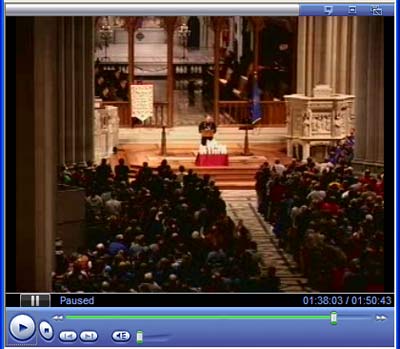 Bernice Powell Jackson was one of several speakers at the March 16 Christian Peace Witness for Iraq service at the National Cathedral. This is the prepared text of her message that evening.
Bernice Powell Jackson was one of several speakers at the March 16 Christian Peace Witness for Iraq service at the National Cathedral. This is the prepared text of her message that evening.
+ Watch video of the entire service
Hope. In English, one syllable. Four letters. But beneath those few letters is a breadth and depth of meaning, a bridge between life and death, a beacon leading out of the darkness. In the fifth chapter of Romans, Paul wrote:
And not only that, but we also boast in our sufferings, knowing that suffering produces endurance, and endurance produces character, and character produces hope, and hope does not disappoint us, because God’s love has been poured into our hearts through the Holy Spirit that has been given to us.
Paul knew that it was hard to be a Christian in Rome. So he wrote to the Romans those words: Hope does not disappoint us.
It’s hard to be a Christian in Washington. We live in a time of cynics. Many years ago I visited South Africa and on my last day of my trip I met a woman who was 126 years old. I came home and often told the story of meeting this remarkable woman. On more than one occasion I was asked, “How did you know for sure she was 126 years old? Did she have a birth certificate?” My response was, “They probably didn’t have birth certificates for anyone in South Africa 126 years ago, but they certainly didn’t have them for black people. And besides,” I would ask, “even if she was 10 years off in her age, she was still 116 – and how many of us have met someone that old?” A time of cynics.
Cynics who do not understand that war can never lead to peace. Cynics who do not understand that violence can only beget violence. Cynics who do not understand that guns can never lead to democracy, and that lies can never lead to truth. But Paul’s word is an antidote to cynicism. Paul’s word is that hope does not disappoint us. Now hope is something different from optimism.
When the imprisoned Czech writer and later President Vaclav Havel was asked about hope, he said that hope is a state of mind, a dimension of the soul, an orientation of the heart that transcends the world that is immediately experienced and is anchored somewhere beyond the world’s horizons.
Hope, for Christians, is anchored in the understanding that with God all things are possible. Hope is that thing that allowed my slave forebears to know, deep down in their souls, despite all that the world told them, despite all that the world did to them, that one day they, or their children, or their children’s children, would be free. Because this is God’s world.
Now, war is the absence of hope. War is the declaration that only violence can conquer the hearts and minds of a people. We are here tonight to dare to say that is not true.
Hope, for Christians, is inextricably linked to the love of God, which is the message of Jesus, which is Jesus himself. On this day, in this place, at this time, Jesus’ words resound throughout the rafters and among the pews of this hallowed place. Words of hope and not words of despair. Words of life and not words of death. Words of love and not words of hate.
I give you a new commandment that you love one another; just as I have loved you, you also should love one another. Jesus’ words and Jesus’ actions.
Hope, for Christians, can never just be a word – it must become an action. Hope for Christians must be a public commitment to follow Jesus in the non-violent struggle for justice and peace. Hope for Christians must be a public sharing of the love of Jesus. Hope for Christians must be a public witnessing to the power of love to overcome hate, to overcome cynicism, to overcome war, to overcome death itself.
So, tonight, we pray. Tonight we march. Tonight we love. And in doing so, we hope. Because hope does not disappoint us.

